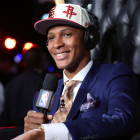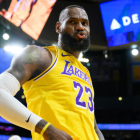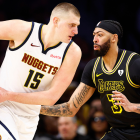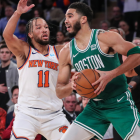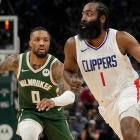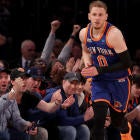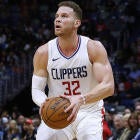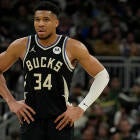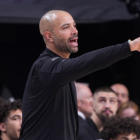
As Petyr "Littlefinger" Baelish once famously uttered on Game of Thrones, chaos is a ladder. The 2022 NBA Draft supplied plenty of chaos. After weeks of reporting suggested that Jabari Smith would be selected No. 1 overall, the Orlando Magic threw a curveball with Paolo Banchero in the top spot. That threw the entire draft off its axis, and surprises came left and right from there. Keegan Murray over Jaden Ivey. A.J. Griffin falling out of the lottery. The Knicks not picking in the first round at all. Nothing went as expected on Thursday, and it created one of the more hectic drafts in recent memory.
But as Baelish told us, that chaos created plenty of opportunity. Teams had to adjust to the curveballs on the fly, and some teams did a significantly better of doing so than others. So with the 2022 NBA Draft now in the books, let's take a look at which teams climbed the ladder of chaos and which teams fell into the pit below. Here are your 2022 NBA Draft winners and losers.
Winner: Houston Rockets
From a pure value standpoint, there was very little separation between the top three prospects in this draft. From a fit standpoint? Smith undoubtedly makes more sense in Houston than Banchero did. The Rockets already have a great young offensive big man in Alperen Sengun. Banchero would have been just fine next to him on that end of the floor, but defensively, the two raised real red flags. Smith doesn't. He has All-Defense potential, and his 3-point shooting should only enhance Sengun's interior game. Smith is a winner in this exchange as well. In Orlando, he would have been joining a team with fairly questionable guard play. In Houston? Jalen Green projects as a future star.
After landing Smith, the Rockets nabbed another of the draft's top defenders in LSU's Tari Eason. Add all of that up and on a night in which they were expected to emphasize offense, the Rockets did a great job of balancing their roster. And the cherry on top? They landed one of the steals of the draft in TyTy Washington at No. 29. The Kentucky guard was expected to be a candidate for Houston at No. 17. Instead they landed him 12 spots later and possibly gave Green a long-term partner in the backcourt.
Loser: Sacramento Kings
No, the Kings did not need another guard. They aren't a loser here purely because they passed on Jaden Ivey. Keegan Murray was probably a better fit in the end anyway. No, the Kings are a loser because of their process as much as their result. They probably could have gotten a haul for the No. 4 pick considering how many teams were interested in Ivey, and even if they'd wanted Murray all along, they probably could've squeezed Detroit for some additional asset with No. 5 considering how public their interest in the Purdue point guard was.
And then, of course, we should also just mention that the consensus ranked Ivey over Murray. In fact, several teams did by virtue of their trade interest. As a general rule, if the Kings think one thing and five or six teams think another, history suggests that the Kings are probably wrong here. It's hard not to think back to 2018, when the Kings took Marvin Bagley over Luka Doncic at least in part because Bagley showed significantly more interest in being a King than Doncic did. It's not quite the same, but it should be noted that Ivey was less than enthused about the idea of going to Sacramento. Now, we're all less than enthused about their draft.
Want more analysis of the 2023 NBA Draft? Listen below and subscribe to the Eye on College Basketball podcast where we take a deep dive on the top players heading to the next level.
Winner: Detroit Pistons
Did the Pistons need Ivey? Not especially. They already have their point guard of the future in Cade Cunningham. But both Cunningham and Ivey should be just fine off of the ball when they share the floor. Cunningham's size and Ivey's athleticism should both give them more than enough defensive versatility to work together, and the offensive upside of having two high-end ball-handlers that can shoot is overwhelming.
If the night had ended there, the Pistons would have been winners, but things just got better. By sacrificing the 2025 first-round pick they got in the Jerami Grant trade along with some meager cap space to take on Kemba Walker, the Pistons jumped back into the lottery and landed Jalen Duren, an extremely athletic center who should benefit quite a bit from two high-end point guards throwing him lobs. Taking on Walker wasn't ideal, but they saved so much by trading Grant without taking on extra salary that they should still comfortably have the room to pursue DeAndre Ayton or Miles Bridges in restricted free agency. GM Troy Weaver took some criticism for the limited return he netted for Grant, but he's more than made up for it with an excellent draft night.
Loser: New York Knicks
We kicked off the losers with the Western Conference's perpetual sad-sack, and we continue with the Eastern Conference equivalent. Maybe all of the prospects the Knicks wanted were gone by the time the No. 11 pick rolled around, and on the surface, it's hard to get too mad at turning one first-round pick into three. The problem is that none of those picks are especially valuable. Barring an injury to Giannis Antetokounmpo, the 2025 Bucks pick will be in the 20s. The other picks acquired from Oklahoma City were protected in ways that limit their value as well. The Knicks don't have enough high-end talent to turn away lottery-caliber prospects.
They're hoping they can find that high-end talent in free agency, and that motivated the decision to dump Kemba Walker's $9.2 million salary. Putting aside the poor value in using a first-round pick to dump less than $10 million (the going rate tends to be closer to $20 million), the idea of going to such lengths to clear cap space for a non-All-Star in Jalen Brunson or the NBA's ultimate wild card in Kyrie Irving is pretty questionable roster-building logic. For the Knicks to go through a season as disappointing as last year was and not come out of it with any first-round rookies sends a bizarre message.
Winner: Philadelphia 76ers
A team with Joel Embiid and James Harden really doesn't have time to develop rookies. Philadelphia needs to win now, and after offering Danny Green and the No. 23 pick to almost every team in the league in exchange for veteran help, they ultimately landed on De'Anthony Melton. The 76ers couldn't have asked for a better package.
Melton, just 24, has shot just below 39 percent from behind the arc over the past two seasons. He was already a very strong point-of-attack defender who racks up steals and blocks like few guards in the game. Now he goes to a Philadelphia team that needs him after playing only 22.7 minutes per game next season. Expect that figure to rise.
Loser: Memphis Grizzlies
Criticizing the Grizzlies for the actual players they selected is a fool's errand. Their draft record is virtually impeccable during the Zach Kleiman era. Where the Grizzlies faltered was in their desire to move Melton, predictable though it was. The Grizzlies have a glut of wings. Melton, Dillon Brooks, Desmond Bane and Ziaire Williams are all competing for the same minutes, and the Grizzlies ultimately decided to break up the logjam before it became an issue by dealing Melton. There are a few problems with that logic.
First, Melton is on a value contract for two more seasons. Thanks to the rookie scale, Williams and Bane are as well. Second, Tyus Jones and Kyle Anderson are both free agents. Why deal away a rotation player before knowing whether two more are returning? And then of course, there are Ja Morant's injury concerns. Melton can't play point guard on offense, but he can defend them on the other end of the floor, and if Jones leaves and they need to get more creative in how they run their offense without Morant, having Melton around would have been valuable. This sort of trade feels a year premature, and while the Grizzlies have a stellar draft record, if they didn't have minutes for Melton, it's going to be even harder for them to find minutes for their new rookies. The Grizzlies just won 56 games. They're the deepest team in the NBA. Right now, veterans should be their priority.
Winners: New Orleans Pelicans and San Antonio Spurs
The Pelicans and Spurs picked back-to-back at No. 8 and No. 9. They took a set of prospects with pretty similar strengths and weaknesses. Dyson Daniels (the No. 8 choice to New Orleans) and Jeremy Sochan (No. 9 to San Antonio) should both be excellent defenders. Daniels is a better ball-handler and playmaker, but Sochan has untapped potential in that arena as well. Both share the same weakness that would have been much more significant on almost any other team: poor shooting.
Here's where the Spurs and Pelicans come in. They have the NBA's two best shooting coaches. In San Antonio, Chip Engelland has spent nearly two decades refining the shooting motions of the youngest Spurs. Kawhi Leonard was his masterpiece, but dozens of players have come through San Antonio and left as better shooters. If he doesn't have the title of NBA's best shot doctor locked up, it's because Fred Vinson has taken it. Over the past three seasons, he's worked wonders with Brandon Ingram, Lonzo Ball, Herb Jones and others. These picks both represent an awareness of what these teams have on their staffs. The Pelicans and Spurs can afford to take risks on players that other teams can't. To many teams, Sochan and Daniels would be very problematic fits. To the Spurs and Pelicans? They're players the rest of the league is undervaluing due to a flaw that they are capable of fixing.
Loser: Washington Wizards
Johnny Davis isn't bad value at No. 10 overall, per se. He projects as a solid NBA role player. Plenty of teams at any range in the draft could use that. But the Wizards have spent the past decade hitting singles. Corey Kispert is fine. Deni Avdija is fine. Rui Hachimura is fine. But the team, obviously, is not fine. They've missed the playoffs in three of the past four years, and if they're going to escape the purgatory of the middle of the draft, it would probably behoove them to take a bigger swing.
Many of those swings were gone. Perhaps Washington would have tried its luck with someone like Daniels or Shaedon Sharpe if they could have, but there were certainly more ambitious picks on the table. Jalen Duren's athleticism would have made him a nice center partner for Kristaps Porzingis. A.J. Griffin comes with major injury concerns, but the best version of him has All-Star potential. One of these days, it would be nice to see the Wizards try to do something a bit bolder with one of their lottery picks. Now? We seem destined to repeat this conversation in a year.
Winner: Atlanta Hawks
The Hawks made a conscious decision in the 2020 offseason when they spent all of their cap space on veterans. Rather than rebuild slowly through the draft, they wanted to compete immediately and sacrifice long-term value. Another year in the lottery might have done the Hawks some good. Last season, with Trae Young as the only player on the roster to register as anything close to a star, they were among the league's bigger disappointments after falling from the Eastern Conference Finals to the play-in tournament. Escaping the middle of the standings is going to require the sort of home run swings Washington doesn't like taking.
The Wizards landing Griffin at 10 would have been a smart pick. For the Hawks? It's a steal. Griffin's health is a red flag after several leg injuries, but the Hawks can afford to work him into the lineup slowly as he develops defensively and rounds out his offensive game. If all goes as planned? They'll have secured one of the draft's best shooters with the upside to thrive in other areas without having to use a lottery pick to get him. Unlike Washington, Atlanta was willing to take a risk, and it could pay off for them big time down the road.
Loser: The betting public
To say that Jabari Smith was a favorite to be the No. 1 overall pick for the entire draft process would be an understatement. One book even infamously had his odds to be selected No. 1 overall at minus-10,000 at one point on Thursday. Banchero's ultimate selection cost bettors everywhere a lot of money, and with the draft now over, we still don't know what exactly happened to spark that Smith buzz.
To recap: A week before the NBA Draft, most books had Banchero at roughly plus-1600 odds. Those odds slowly started to go down over the following week until Wednesday, in which they hovered around plus-600. And then, in one flurry after midnight on Thursday morning, Banchero became the favorite. In roughly an hour, Banchero jumped to odds that hung around minus-200 for the rest of the night.
We don't have nearly enough information to understand what actually happened yet, but the implications of the swing should be pretty concerning to bettors. Las Vegas somehow knew about one of the most important NBA transactions of the year before the league's preeminent insiders did. Nobody definitively reported Orlando's plans before the draft began. Normally we'd say that the Magic did a great job of concealing their intentions, but there wasn't much need for them to do so picking No. 1, and even if there was, the sports books clearly sniffed it out. What exactly this means, we can't say. But it's one of the more important stories to come out of this draft, and at the very least, it is going to change the way people bet on the draft forever.













